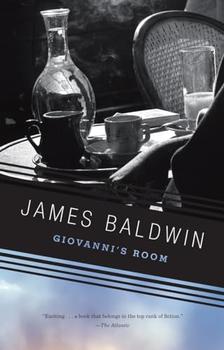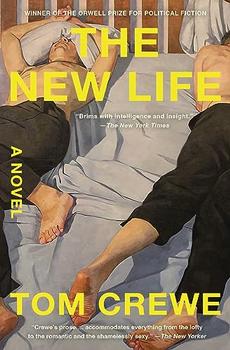Summary | Excerpt | Reading Guide | Reviews | Beyond the book | Read-Alikes | Genres & Themes | Author Bio

The first time I read James Baldwin's novel Giovanni's Room, I was around the same age as the book's protagonist David, a twenty-something American living in 1950s Paris who becomes reluctantly embroiled in an affair with an Italian man. By contrast with many classics I'd been assigned or directed to in school, multi-perspective books about Family-with-a-capital-F, the story's modest size and scope made it seem confident and attractive, as coolly European as its setting. What it lacked in volume it made up for in drama. It was clear from the start that David's lover Giovanni had been condemned to death, and that this was, in some way, connected to David's inability to be with him. It was clear there would be romance, there would be sex, there would be tragedy, alcohol, violence, desperation.
The morning after David meets Giovanni, a bartender at a gay bar, the two drift to a café with Guillaume, the bar owner, and a regular, Jacques, where they dine on oysters and wine and eventually leave for Giovanni's rented room. Before David goes home with Giovanni, he tilts towards the possibility with a sense of inevitable decline. Closeted and self-loathing, having surrounded himself with other queer people but maintained a distance from them, he feels admitting an attraction to men generally and Giovanni specifically will come with disastrous consequences (which is true, even if he drives those consequences himself). But in this moment, Baldwin captures a sense of incandescent beauty, of hovering in a space where all possibilities still exist, a sense that the oncoming disaster, while foretold, is in no way inevitable: "And here my baby came indeed, through all that sunlight, his face flushed and his hair flying, his eyes, unbelievably, like morning stars." In my twenties, I lived for moments like these in my life and literature, for the magical feeling of the future lying open like a dream. What I or the characters in question did with it hardly seemed to matter.
At one point during this morning scene, David is cornered into a tête-à-tête with Jacques, who is characterized as a predatory, pathetic middle-aged gay man — by his own admission unable to experience real affection. Seeing David in the first flushes of love, Jacques warns him against reaching this withered state himself, urging him to respond to his feelings for Giovanni honestly and without shame. While this is the only context in which Jacques is accorded anything like wisdom or foresight, we understand that he's right and that David, already insensitive to his desires, will fumble the advice.
Reading Giovanni's Room now, closer to Jacques' age than David's, I still appreciate Baldwin's powers of description and scene-setting, and the gorgeous movement of his prose. But I see so much more in this deceptively simple and predictable-by-design story. Giovanni's Room is the only book Baldwin ever wrote featuring all white characters, and he did so for a reason — not feeling he could address issues relating to Blackness and queerness in the same book (though he did this later). But this work as much as the rest of his work affords importance to the body and to communal existence. Sexuality, social identity, and physical intimacy are treated as crucial parts of the human condition, not just vital to parsing societal values and signifiers but to a serious philosophical understanding of life.
In Giovanni's Room, Baldwin shows how David's sense of his masculinity and whiteness affects how he receives his queerness, how he treats it as shameful, even in private, how he wields power over others to stave off a growing sense of helplessness. He views women — like his fiancée Hella, with whom he believes, for a time, he can have a future — as adornments to keep others from seeing him in his nakedness and nothingness. Against Giovanni — who is emotional, vulnerable, and seems to feel, if not exactly racialized, made "ethnic" in the eyes of a well-off white American — David distinguishes himself as (supposedly) calm, cool, and rational to the point of coldness and cruelty. These ways of using others are not just learned social habits; they are existential constructs necessary to a way of being he has chosen.
Giovanni's Room harbors a fatalistic tone, and its tragic arc may at first seem consistent with the still-prevalent idea that homosexual relationships are somehow inherently doomed. But Baldwin isn't saying that. The sense of inevitability present isn't the inevitability of doomed love but of love alone. It's because David is unwilling to accept inevitabilities like love and death that he creates so many complications for himself. Baldwin leaves us with the feeling that what David, and certainly Giovanni, have suffered as a result of David's dishonesty is far worse than anything society could have done to them — or, perhaps, that these two things are the same. After all, societal violence doesn't need to be carried out by others when people are willing to inflict it on themselves and their loved ones.
We also see how David's modern American ideas of individualism and choice, and not Giovanni's traditional Italian rural and religious background, undermine their relationship. Giovanni's Room is still relevant as a critique of American exceptionalism and entitlement today. It shows how shame and confusion can be cultivated in a person with dangerous and terrible results. And how beauty can cause us to deceive ourselves; beauty, which gives itself freely and asks nothing of us for the time being, may lead us to the belief that any choice can be remade later or exchanged for another, that people and experiences are expendable, that shimmering moments like the one in the café are ongoing, renewable, endless. When they are, in fact, always on the cusp of expiring, and their propagation depends on what we give back.
![]() This review
first ran in the January 29, 2025
issue of BookBrowse Recommends.
This review
first ran in the January 29, 2025
issue of BookBrowse Recommends.

If you liked Giovanni's Room, try these:

by Tan Twan Eng
Published 2024
From the bestselling author of The Garden of Evening Mists, a spellbinding novel about love and betrayal, colonialism and revolution, storytelling and redemption.

by Tom Crewe
Published 2024
A brilliant and captivating debut, in the tradition of Alan Hollinghurst and Colm Tóibín, about two marriages, two forbidden love affairs, and the passionate search for social and sexual freedom in late 19th-century London.
Your guide toexceptional books
BookBrowse seeks out and recommends the best in contemporary fiction and nonfiction—books that not only engage and entertain but also deepen our understanding of ourselves and the world around us.